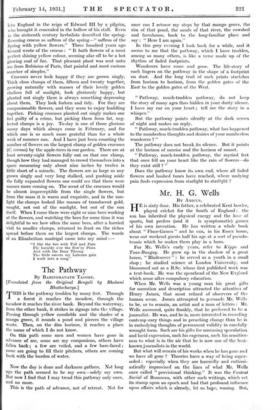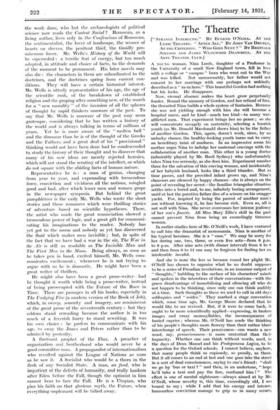Mr. H. G. Wells
BY AMICUS.
HE is sixty-four. His father, a celebrated Kent bowler, played cricket for the South of England : the son has inherited the physical energy and the love of sports, but prefers (and it is symptomatic) games of his own invention. He has written a whole book about " Floor-Games " and he can, in his Essex home, wear out weekend guests half his age at a sort of pseudo- tennis which he makes them play in a barn.
For Mr. Wells's early years, refer to Kipps and Tono-Bungay. He grew up in the shadow of a great house, " Bla.desover " : he served as a youth in a small shop ; he studied science at London University, and blossomed out as a B.Sc. whose first published work was a text-book. He was the spearhead of the New England which arose after compulsory education.
When Mr. Wells was a young man his great gifts for narration and description attracted the attention of Henry James, that most refined of observers of the human scene. James attempted to persuade Mr. Wells to be, or to remain, an artist and a man of letters : Mr. Wells answered, quite frankly, that he preferred to be a journalist. He was, and he is, more interested in recording contemp 3rary things and in preaching change than he is in embodying thoughts of permanent validity in carefully wrought form. Such are his gifts for unceasing speculation and lucid expression, such his eagerness, such his sensitive- ness to what is in the air that he is now one of the best- known journalists in the world.
But what will remain of his works when he has gone and we have all gone ? Theories have a way of being super- seded : especially when they are hurriedly and enthusi- astically improvised on the lines of what Mr. Wells once called " provisional thinking." It was the Contrat Social of Rousseau, with other such writings, which set its stamp upon an epoch and had that profound influence upon affairs which is already, let us hope, waning. But. the work done, who but the archaeologists of political science now reads the Cantrat Social? Rousseau, as a living author, lives only in the Confessions of Rousseau, the sentimentalist, the lover of landscape, the wearer of hearts on sleeves, the penitent thief, the timidly pro- miscuous lover. Mr. Wells's Histoiy of the World will be superseded : a terrific feat of energy, but too much adapted, in attitude and choice of facts, to the demands of the moment to be permanent. His later novels may also die : the characters in them are subordinated to the doctrines, and the doctrines spring from current con- ditions. They will have a certain historical interest. Mr. Wells is utterly representative of his age, the age of the scientific rush, of the breakdown of established religion and the groping after something new, of the search for a " new morality " of the invasion of all the spheres of thought by rapid thinkers unaware of the past. To say that Mr. Wells is unaware of the past may seem grotesque, considering that he has written a history of the world and is always talking in terms of millions of years. Yet he is more aware of the " molten ball " and the dinosaur than he is of the thought of the Greeks and the Fathers, and a great deal of his " provisional " thinking would not have been done had he condescended to study the history of their thought and to discover that many of his new ideas are merely rejected heresies, which will not stand the scrutiny of the intellect, or which do not square with the abiding facts of human nature.
Representative he is : a man of genius, changing from year to year, and expounding with tremendous force, conviction and vividness all the notions, mingled good and bad, after which lesser men and women grope in the newspaper symposia. But behind the great pamphleteer is the early Mr. Wells who wrote the short stories and those romances which were thrilling stories of adventure based on scientific hypotheses. There, the artist who made the great renunciation showed a tremendous power of logic, and a great gift for communi- cating his imaginations to the reader. Nobody has yet got to the moon and nobody as yet has discovered the fluid which makes men invisible ; but, in spite of the fact that we have had a war in the air, The War in the Air is still as readable as The Invisible Man and The First Men in the Moon. Being always, as soon as he takes pen in hand, excited himself, Mr. Wells com- municates excitement ; whenever he is not trying to argue with us he is dramatic. He might have been a great writer of thrillers.
He might also have been a great prose-writer—had he thought it worth while being a prose-writer, instead of being preoccupied with the Future of the Race in Time. There arc passages in all his books, especially in The Undying Fire (a modern version of the Book of Job), which, in sweep, sonority and imagery, are reminiscent of the great prose of the seventeenth century : but they seldom stand rereading because the author is in too much of a feverish hurry to stand rewriting. It was his own choice : he prefers to communicate with his age, to sway the Joans and Peters rather than to be admired by posterity.
A fluctuant prophet of the Flux. A preacher of organization and . brotherhood who would never be a good committee man. A propagandist of internationalism who revolted against the League of Nations as soon as he saw it. A Socialist who would be a thorn in the flesh of any Socialist State. A man, au fond,• who is impatient of the defects of humanity, and really hankers after Eden before the Fall, though the optiMist in him cannot bear to face the Fall. He is a Utopian, who pins his faith on that glorious myth, the Future, when everything unpleasant will be tidied away. -
















































 Previous page
Previous page